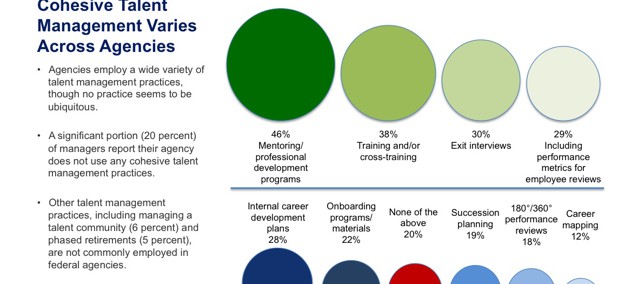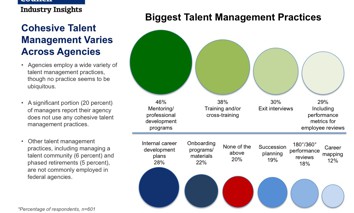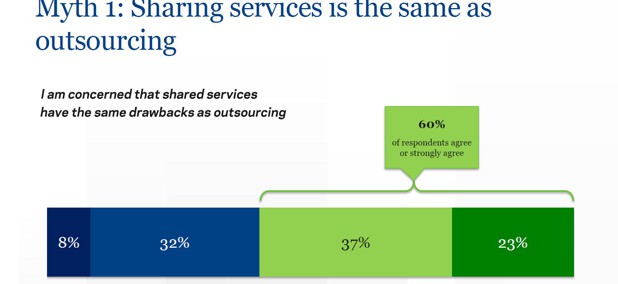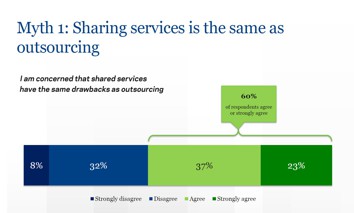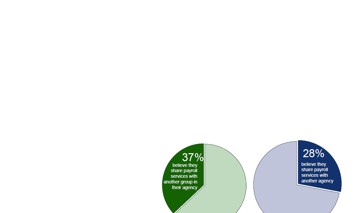Industry Insights
Retaining and Developing Tomorrow's Federal Talent
Retention and development are two important components to keeping any organization staffed with the right talent. Amid ongoing budget deficits, many federal agencies have been struggling in these efforts, resulting in skills gaps in many occupational areas.
Industry Insights
7 Myths Challenging Shared Service Adoption
Though some federal agencies have made progress in shared service adoption and at least nine federal shared service providers (FSSPs) have emerged across various lines of business, widespread concerns over the implications of shared services are slowing further implementation of the 2012 Federal IT Shared Services Strategy. This in-depth study analyzes the myths challenging shared service adoption.
Industry Insights
Video Conferencing Mandates: What Your Agency Needs to Know
Video conferencing technologies are on the rise, and federal leaders are mandating its use more than ever. What your agency needs to know.
Industry Insights
Keeping Pace: A Norwegian Case Study for Digital Government
How the Federal Government is keeping pace with digital government leaders around the world.
Industry Insights
Federal Survey Results: 6 Key Challenges to Adopting Shared Services & How to Overcome Them
The Federal IT Shared Services Strategy requires that federal agencies first look at existing systems and services before considering new IT investments, but many are having difficulty with the transformation. In a recent Government Business Council survey of 300 federal managers, just 44 percent of respondents indicated that their agencies are really “shared-first.” Identifying which services should be moved to a shared model and finding existing providers are among the top challenges facing today’s federal leaders.
Industry Insights
Protecting the Past & Leaving Room for the Future: Challenges Facing Federal Records Management
The Presidential Directive on Records Management outlines a clear future path for the proper storage, destruction and maintenance of paper and electronic agency records. The type of accurate and complete recordkeeping detailed by the Directive is also essential to compliance with other initiatives, including sequestration, the “Freeze the Footprint” Real Estate Mandate, the Executive Order on Open Data, continued progress on the Federal Data Center Consolidation Initiative (FDCCI) and a new focus on the Freedom of Information Act (FOIA). Despite the high priority many federal leaders place on records management, agencies are in various stages of implementation.
Industry Insights
Data Analytics: The Prescription for High Health Care Costs
Ask anyone today and you’ll hear that health care costs are astronomically high. National health care expenditures nearly doubled from 2000 to 2011, from $1,377.2 billion to $2,700.7 billion, and they continue to climb. Escalating health care costs have both direct and indirect effects on federal finances. Though agencies may not be able to affect the price of care themselves, steps can be taken to ensure that dishonest activity does not add to already inflated costs. With the uncertainty associated with the Affordable Care Act, curbing unnecessary spending is a top priority.
Industry Insights
The Need for Self-Service Data Tools, Not Scientists
Data science is one of today’s hottest fields and one that is rife with competition. Projections indicate that employer demand requires that the United States increase the number of graduates with skills handling large amounts of data by as much as 60 percent. The federal government is one of the organizations most in need of data scientists, but hiring freezes, slashed training budgets and a lack of qualified candidates have all hampered the ability to recruit these types of professionals. Faced with such obstacles, agencies have been developing creative solutions to fill the hiring gap.
Industry Insights
The Cloud Roadmap for Agencies: How to move fast (and safe) to capture huge savings
When the Cloud First Strategy was released in 2010, agencies were concerned with adoption and basic capabilities of cloud computing. At the time, there was a great deal of reluctance to move to the cloud due to security concerns and compatibility with legacy IT systems. After almost two years, the federal mindset has shifted from reluctant adopter to enthusiastic learner.
Industry Insights
In the Eye of the Storm: Public Sector Leadership in the Logistics of Disaster Relief
By 2014, an average of 375 million people per year will be affected by climate-related disasters. A vast network of NGOs has arisen to provide disaster relief, but it will take the leadership of federal, state, and local agencies to tackle the growing number of disasters at home and abroad.
Industry Insights
Reinforcing Data, Not Bunkers: A New Era of Data-Centric COOP Planning
Instead of drills and assigning bunker beds, the new era of COOP planning will be focused on data security, continuous access, and keeping federal employees online.
Industry Insights
Inside the DCGS-A: Advancing Real-Time Intelligence
A look at the present and future of the Army's massive, groundbreaking intelligence system.
Industry Insights
The Modern Reality of COOP Planning: Reinforcing Data, not Bunkers
Instead of drills and assigning bunker beds, the new era of COOP planning will be focused on data security, continuous access, and keeping federal employees online.
Industry Insights
3 Signs You Need to Upgrade Your Agency's IAM System
Though 83 percent of the 24 major federal agencies have IAM systems in place, a March 2013 FISMA report revealed numerous gaps in agency implementation. Here are 3 signs you may need to upgrade your IAM system.
Management Matters - Advice And Comment
Rising to the Top
Five things successful women in government do.
News
Government Employees Get No Respect?
Tell us whether you think you get the recognition you deserve.
Management
3 Ways Agency Leadership Can Keep Employees Engaged
Promoting employee engagement is vital right now--here are three ways to do it.
Management
Amidst Drawdowns in Iraq and Afghanistan, Army Responds With EAGLE
New contract program aims to consolidate different vehicles.
Management


